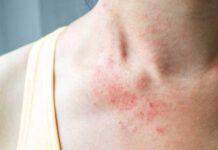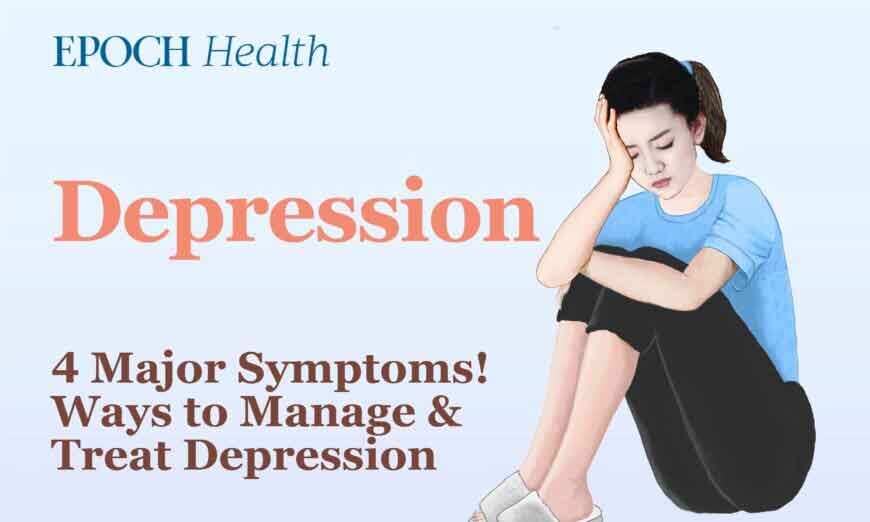
People with depression are sometimes described as “overthinking,” “sentimental,” or having “low stress tolerance.” Even in the modern age when knowledge about depression has become increasingly common, there are still some prejudices or stereotypes about depression. On the other hand, when someone says, “I’ve been feeling down lately,” “I’m not interested in anything,” “I feel so tired every day,” etc., they may indeed feel depressed, but they do not necessarily suffer from depression.
Depression seems to have become a common mental disorder. It affects more than 264 million people worldwide, and it is more common in women than in men. So what are the symptoms and causes of depression? How can it be treated and managed? This article will guide you through these questions with illustrations.
Depression Is More Than Just Feeling Down
There are many symptoms associated with depression, and they can be psychological, physical, lifestyle-related, and more. They are divided into four categories.
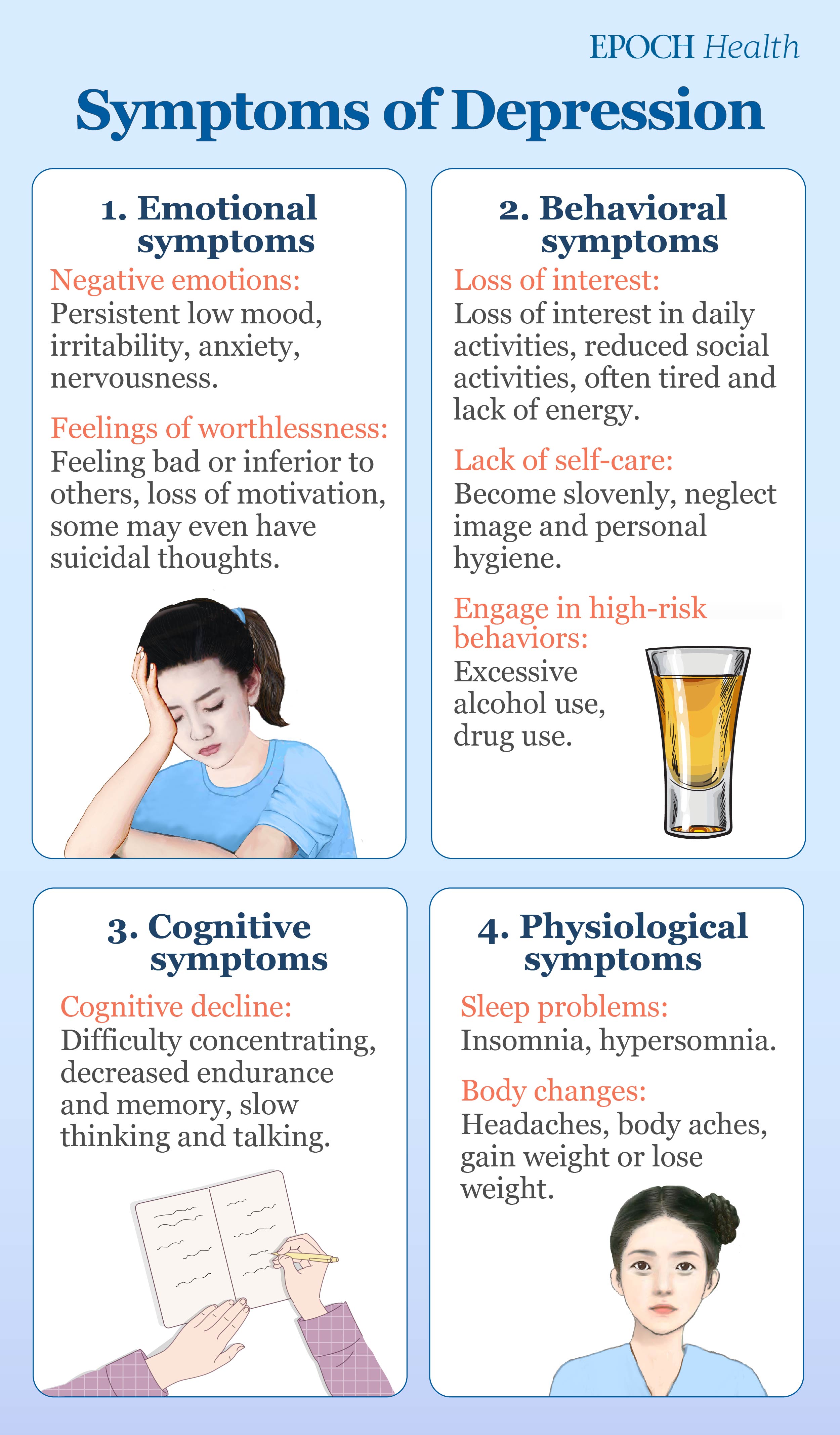
1. Emotional Symptoms
Negative emotions: persistent low mood; unable to feel happy; irritability, anxiety, excessive worry, and nervousness
Feelings of worthlessness: feeling bad or inferior to others; loss of motivation to do things; helplessness and hopelessness, unable to envision positive future development; feeling uncertain about continuing to live, and may even have suicidal thoughts.
2. Behavioral Symptoms
Loss of interest: loss of interest in many daily activities; reduced social activities; often tired and lack of energy
Lack of self-care: People who used to be tidy, well-groomed, or concerned about their appearance may become slovenly and neglect their image and personal hygiene.
Engage in high-risk behaviors: excessive alcohol use, drug use, or increased use of prescription drugs in an attempt to alleviate symptoms of depression
3. Cognitive Symptoms
Cognitive decline: difficulty concentrating; decreased endurance and memory; slow thinking and talking; things that were once perceived as easy are now difficult to do
4. Physiological Symptoms
Sleep problems: insomnia, restless sleep through the night, early waking, or hypersomnia (excessive sleepiness)
Body changes: headaches, body aches; changes in appetite and weight; one may lose weight inadvertently by not feeling hungry, or gain weight by overeating
What Are the Causes of Depression?
A person may suffer from depression for many reasons. For example, some people may have a family history that increases their likelihood of developing depression. Life difficulties and major stressful events can also ultimately lead to depression.
Common causes of depression include:
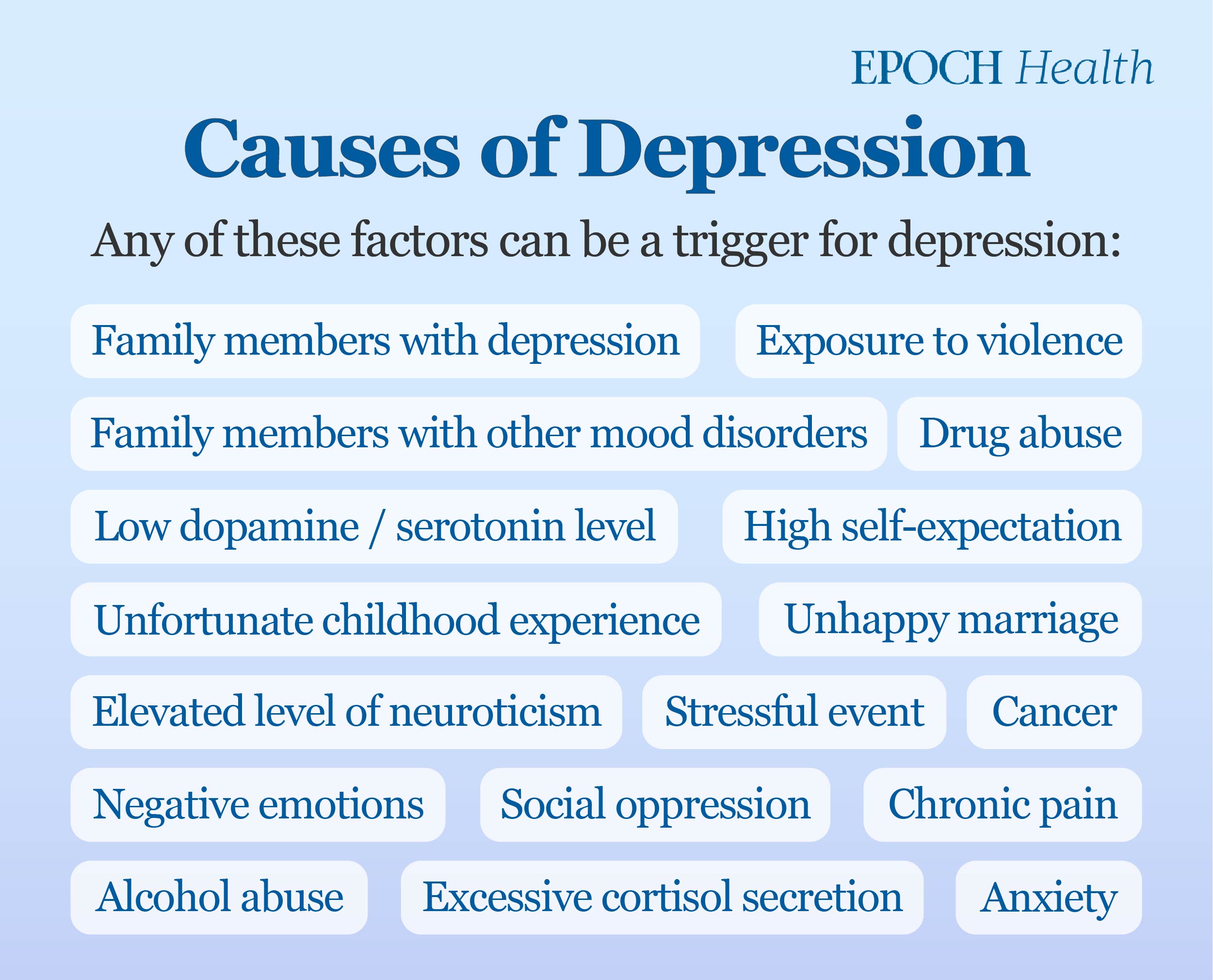
Genetic
Depression can be partially explained by genes. In genetic studies, if one of the identical twins has depression, the other has a 70 percent chance of developing it at some point in their life. Additionally, a family history of depression or other mood disorders also increases a person’s risk of developing the illness.
Physiological Factors
The cause of depression may be related to neurotransmitters, such as dopamine and serotonin, in the brain.
Current research suggests that the dopamine system may be impaired in patients with depression. Dopamine, which regulates the brain’s reward system, keeps people energized and motivated. This may explain why people with depression experience symptoms such as a lack of enjoyment and loss of motivation.
Serotonin makes people feel happy. The brains of patients with depression may be less sensitive to serotonin.
In addition to the chemicals in the brain, the emotional state and mood regulation during a depressive episode are associated with changes in specific areas of the brain, such as the amygdala, hippocampus, etc. Depression is also associated with hormonal imbalances, such as excess secretion of the stress hormone, cortisol.
Social Environmental Factors
The environment in which people live, ranging from family to society, can have a significant impact on their physical and mental state. Unfortunate childhood experiences, stressful life events, marital and family problems, and interpersonal issues are some of the factors that may increase the risk of depression.
An unfortunate childhood may increase the chances of developing depression later in life, and it can also affect how people respond to stress and fear.
Psychological Factors
One of the psychological factors associated with depression is neuroticism. Individuals with elevated levels of neuroticism tend to exhibit more negative emotional reactions to stressful events than the average person. Additionally, low self-confidence, low self-esteem, pessimism, self-criticism, and being overly critical of oneself may all be related traits that contribute to the onset of depression. In short, negative thinking pattern is a significant risk factor for depression.
Conditions/Diseases
Other mental illnesses, such as anxiety disorders and post-traumatic stress disorder (PTSD), or chronic physical conditions such as cancer and chronic pain, can also be triggers for depression.
Drugs and Alcohol
Some people may turn to alcohol or drugs as a way to cope with life’s challenges, but these behaviors can lead to even lower mood and increase the risk of developing depression.
3 Ways to Treat and Manage Depression
1. Psychotherapy
Psychotherapy mainly uses conversation as treatment. For mild depression, this method can be used alone; for severe depression, it can be used together with medication.
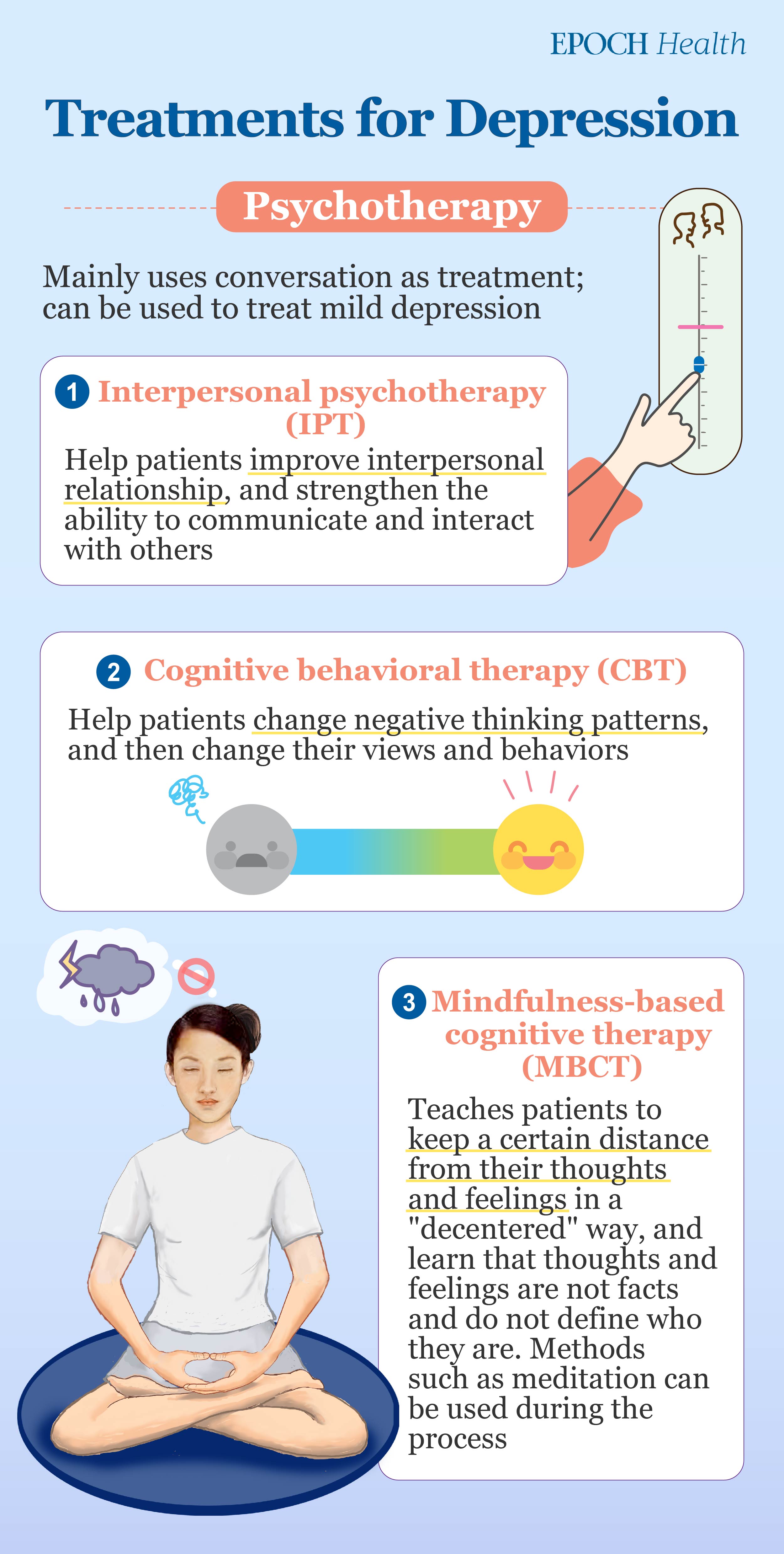
• Interpersonal psychotherapy (IPT)
Interpersonal psychotherapy has been clinically proven to be effective. This treatment method believes that depressive symptoms seriously affect the patient’s interpersonal interaction with family members, friends, colleagues, etc. The patient’s reduced ability to solve interpersonal problems can lead to low self-esteem. Therefore, the purpose of interpersonal therapy is to help patients improve their interpersonal relationships, and strengthen their ability to communicate and interact with others, thereby alleviating depressive symptoms.
• Cognitive behavioral therapy (CBT)
The goal of cognitive behavioral therapy is to change the patient’s negative thinking patterns. Usually, it begins by teaching patients that negative thoughts can lead to low mood. Patients will be asked to keep a record of their daily negative thoughts and be aware of how these thoughts affect their emotions. Then, they will be guided to change their views and behaviors.
For example, if a patient thinks, “I’m useless and I can’t do anything well,” the therapist will then help the patient find evidence that can refute these thoughts: Does not doing anything well really mean that one is useless? Or do these just happen to be things that the patient is not good at? The therapist will guide the patient to challenge their overly negative thoughts and discuss with the patient strategies to reduce these thoughts.
• Mindfulness-based cognitive therapy (MBCT)
Mindfulness-based cognitive therapy aims to prevent relapse of depression. Patients may relapse by falling back into seeing things using the negative thinking they had during previous episodes of depression. Therefore, this therapy method teaches patients to recognize when they start to become depressed, and try to adjust in a “decentered” way. In other words, it teaches patients to keep a certain distance from their thoughts or feelings, and tell themselves that “my thoughts are not facts” and “my thoughts do not define me.” Methods such as meditation can be used during the process.
2. Physiotherapy
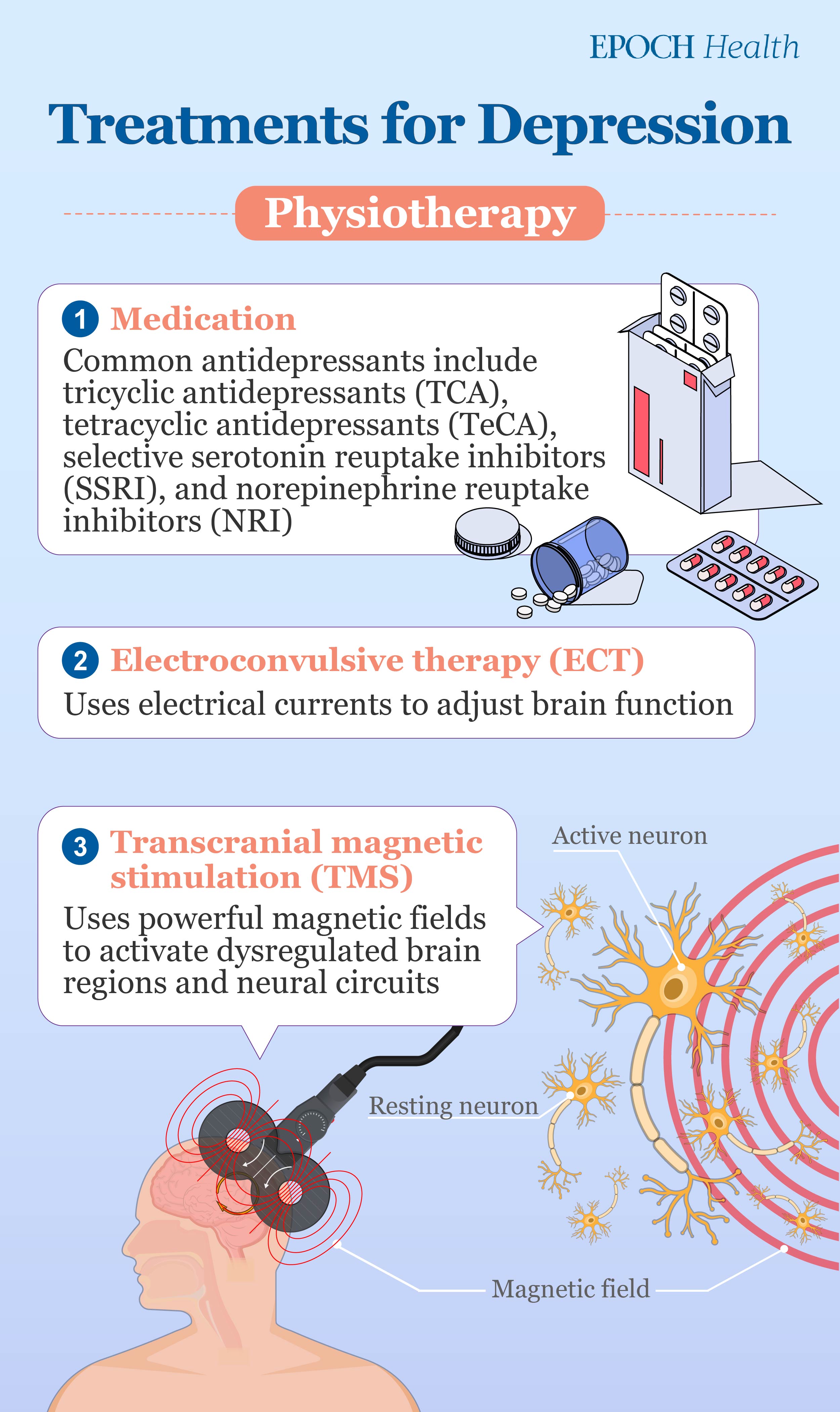
• Medication
Medication is currently the most common way to treat depression. Common antidepressants include tricyclic antidepressants (TCA), tetracyclic antidepressants (TeCA), selective serotonin reuptake inhibitors (SSRI), norepinephrine reuptake inhibitors (NRI), etc.
However, medication may not be effective for everyone, and like all drugs, its benefits come with risks.
• Electroconvulsive therapy (ECT)
This treatment involves passing an electrical current through the patient’s brain, which induces electrical discharges and physiological changes in brain cells to adjust brain function. This type of treatment is drastic and controversial, and it is often used when medication or other treatments have failed.
• Transcranial magnetic stimulation (TMS)
This treatment uses the repeated application of powerful magnetic fields to activate brain regions and neural circuits that are dysregulated during depressive episodes.
3. Natural therapy
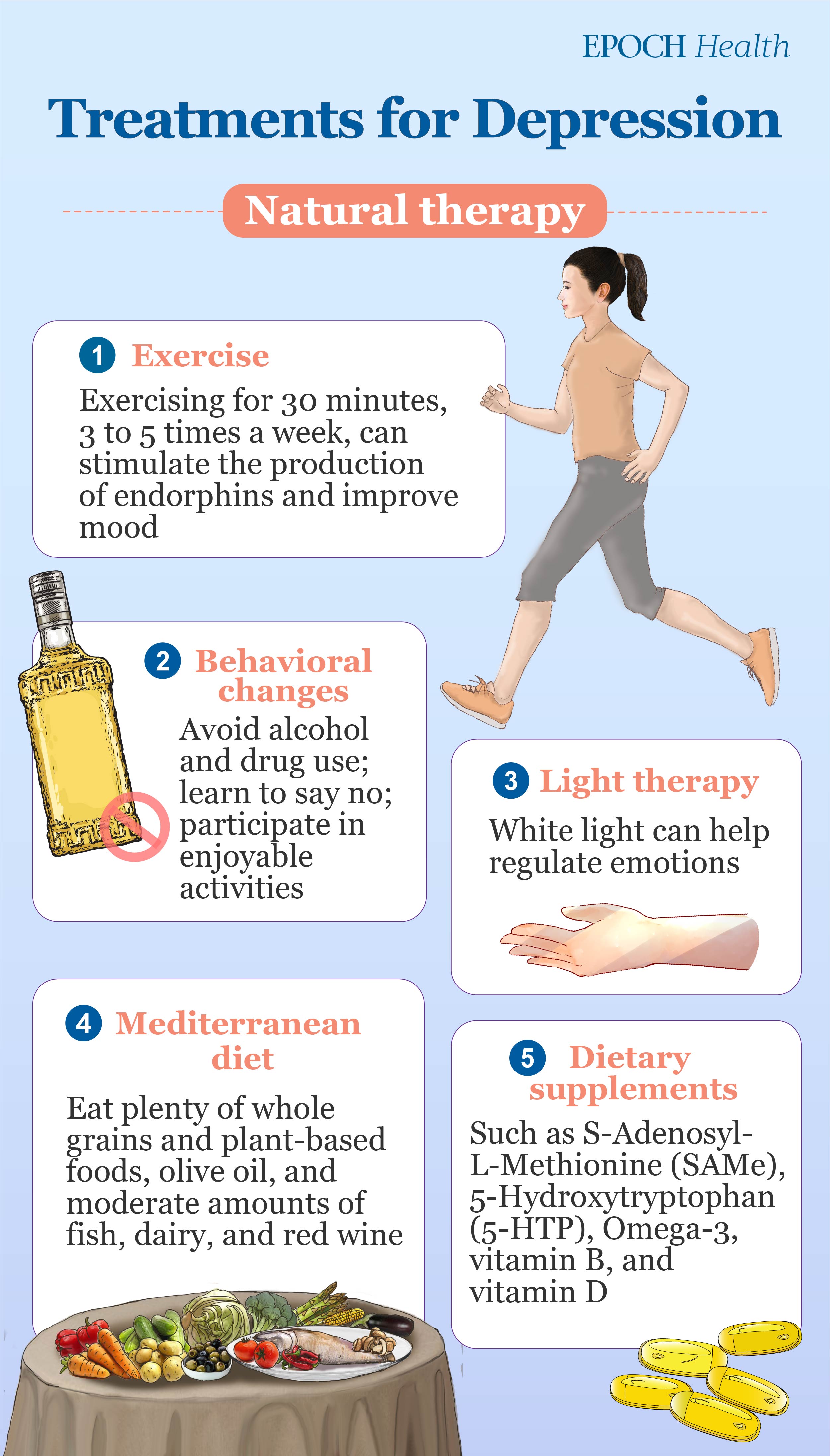
• Exercise
Exercising for 30 minutes, three to five times a week, can stimulate the production of endorphins, the hormone that improves mood.
• Behavioral changes
Avoiding drinking and drug use can prevent depression symptoms from worsening. Learn to say no and avoid being at a loss in the face of difficulties in life. Maintain good self-care, such as following a healthy diet or participating in enjoyable activities.
• Light therapy
Exposure to white light can help regulate emotions and improve depression. This therapy is primarily used to treat seasonal affective disorders.
• Mediterranean diet
The Mediterranean diet consists of rich sources of whole grains and plant-based foods, olive oil, as well as moderate amounts of fish, dairy products, red wine, etc. A study targeting Spanish young adults found that the Mediterranean diet can reduce the incidence of depression. The Mediterranean diet is rich in vitamin B, which plays an important role in the synthesis of dopamine, norepinephrine, and serotonin, leading to improved mental health and mood.
• Dietary supplements
Patients with depression can take supplements, such as S-Adenosyl-L-Methionine (SAMe), 5-Hydroxytryptophan (5-HTP), St. John’s wort, omega-3 fatty acids, and vitamins containing vitamin B or vitamin D. It is worth noting that St. John’s wort is used as an antidepressant in Europe, but it has not been approved in the United States. Research on its effectiveness has yielded both positive and negative outcomes.
Some treatment methods may lack sufficient research to prove their actual effectiveness in treating depression, and some supplements may not be approved for use in some countries. Therefore, patients need to follow the instructions of health care professionals when receiving treatment.
Important Notice: This article was originally published at www.theepochtimes.com by Health 1+1 where all credits are due.
Disclaimer
The watching, interacting, and participation of any kind with anything on this page does not constitute or initiate a doctor-patient relationship with Dr. Farrah™. None of the statements here have been evaluated by the Food and Drug Administration (FDA). The products of Dr. Farrah™ are not intended to diagnose, treat, cure, or prevent any disease. The information being provided should only be considered for education and entertainment purposes only. If you feel that anything you see or hear may be of value to you on this page or on any other medium of any kind associated with, showing, or quoting anything relating to Dr. Farrah™ in any way at any time, you are encouraged to and agree to consult with a licensed healthcare professional in your area to discuss it. If you feel that you’re having a healthcare emergency, seek medical attention immediately. The views expressed here are simply either the views and opinions of Dr. Farrah™ or others appearing and are protected under the first amendment.
Dr. Farrah™ is a highly experienced Licensed Medical Doctor certified in evidence-based clinical nutrition, not some enthusiast, formulator, or medium promoting the wild and unrestrained use of nutrition products for health issues without clinical experience and scientific evidence of therapeutic benefit. Dr. Farrah™ has personally and keenly studied everything she recommends, and more importantly, she’s closely observed the reactions and results in a clinical setting countless times over the course of her career involving the treatment of over 150,000 patients.
Dr. Farrah™ promotes evidence-based natural approaches to health, which means integrating her individual scientific and clinical expertise with the best available external clinical evidence from systematic research. By individual clinical expertise, I refer to the proficiency and judgment that individual clinicians acquire through clinical experience and clinical practice.
Dr. Farrah™ does not make any representation or warranties with respect to the accuracy, applicability, fitness, or completeness of any multimedia content provided. Dr. Farrah™ does not warrant the performance, effectiveness, or applicability of any sites listed, linked, or referenced to, in, or by any multimedia content.
To be clear, the multimedia content is not intended to be a substitute for professional medical advice, diagnosis, or treatment. Always seek the advice of your physician or other qualified health providers with any questions you may have regarding a medical condition. Never disregard professional medical advice or delay in seeking it because of something you have read or seen in any website, video, image, or media of any kind. Dr. Farrah™ hereby disclaims any and all liability to any party for any direct, indirect, implied, punitive, special, incidental, or other consequential damages arising directly or indirectly from any use of the content, which is provided as is, and without warranties.



